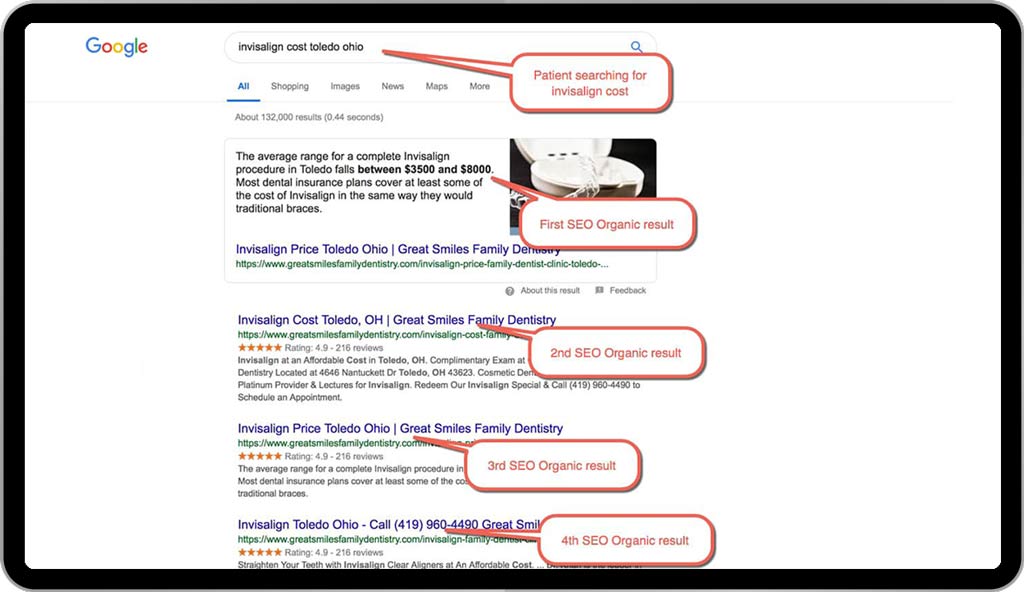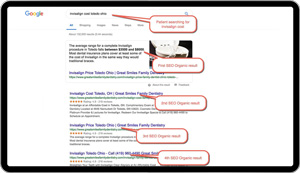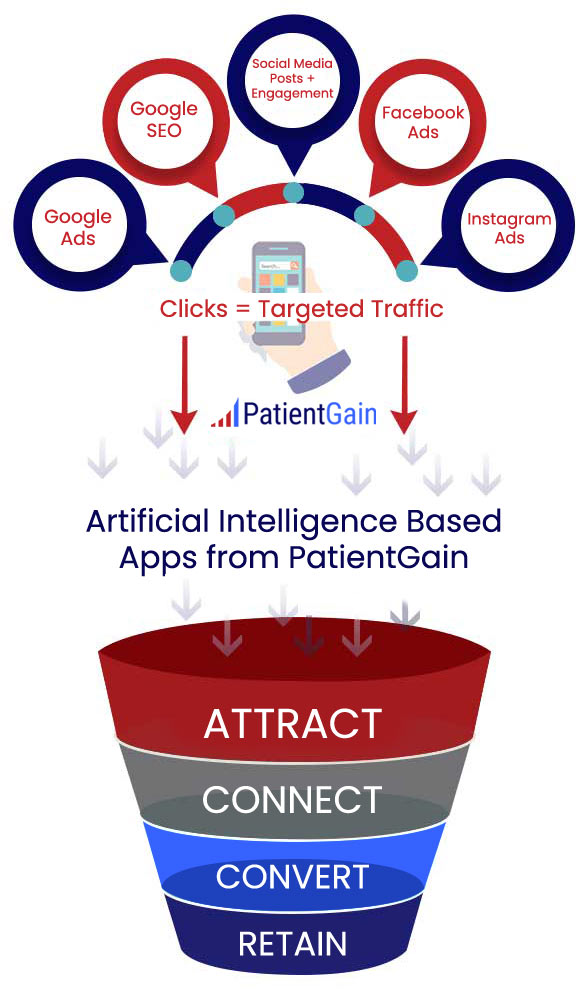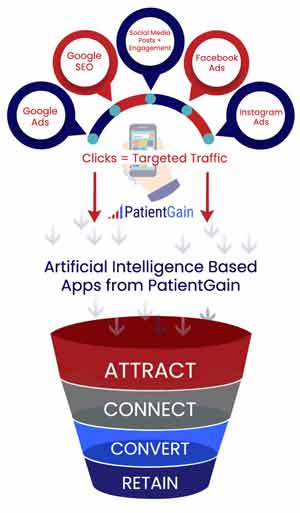How Voice Search Impacts Your Dental SEO. Voice Search Is Big on Mobile Devices, and People Are Using It Every Day. Included in GOLD Service $799/mon
The utility of voice search lends itself to be a powerful tool on mobile devices. Instead of trying to type something out on a tiny keyboard, it is often easier just to speak your question for a digital assistant.
Smart speakers and digital assistants are becoming more common in people’s households, smartphones, and even computers. While some people are worried that “the computers are always listening to us,” many people are taking advantage of having an on-demand search engine available at their beck and call. Many people use voice search to get answers to questions and information about businesses, including dental practices. Studies show that nearly 50 percent of all searches are currently made using these devices. Voice search is becoming increasingly important to medical practices, including dental practices. Keeping this in mind, websites must adjust to take advantage of this new kind of search before their competitors do. Voice search through these devices is still very new, and methods to make sure a website is prepared for it are evolving. However, dental practices can take some steps for the further proliferation of smart speakers and digital personal assistants that use voice search.
Voice search is big on mobile devices, and people are using it every day.
The utility of voice search lends itself to be a powerful tool on mobile devices. Instead of trying to type something out on a tiny keyboard, it is often easier just to speak your question for a digital assistant. Voice searches generally tend to fall into two categories, informational and local search.
Informational
- What is the weather tomorrow?
- How many tablespoons in 3 cups?
- Who won the best actor award in 2010
Local Search
- Who is the best dentist in the area?
- Is there a dentist open on Saturday?
- How close is the nearest dentist to me?
A local search will be of more interest to a dental practice. However, there are opportunities to get mentioned in informational searches if the content on a site is very well written. Local searches are what a dental practice should concentrate on to take advantage of voice search. While mobile devices are generally considered the first and only source of voice searches, other devices take advantage of it. Smart speakers like Echo and Google Home both have voice search capabilities. Computers with Windows have Cortana, and Apple computers now have access to Siri, which is also on all iPhones and iPads. At home, these digital assistants not only provide voice search but can be connected to smart devices, like lights, temperature control panels, and even TVs and video game consoles. With Echo smart speakers, people can even order things off of Amazon without looking at a screen.
As voice commands and voice search become more common, the use of digital personal assistants to find information for people will become more natural. They will also become more integrated into more products being used every day. Some cars even have personal digital assistants installed, allowing them to use voice search when driving for other tasks. Dental practice websites need to get their website ready today to take advantage of these voice searches immediately!
Example below, a patient speaking to a mobile digital assistant, Apple Siri, searching for cost of invisalign in toledo ohio.


When it comes to voice search, “Conversation is King.”
When it comes to content marketing and traditional search engine optimization, “Content is King” is a phrase thrown around a lot. It does apply in many ways, but it is more of a Grand Duke than a King when considering voice search. Content is still important, but “conversation” is just as if not more important. Search engines can function great if you just type in a few words for your search query. Voice search queries, however, are made using spoken language. The spoken language often has a nuanced context and immediacy that text-based search is still trying to understand. Search engines use artificial intelligence to develop algorithms that better understand conversations in terms of intent and context, two important factors when providing relevant results. These systems look at past queries and do a much better job at providing relevant results to voice search using data they have collected. Voice search is often associated with users wanting to accomplish actions, tasks, or even transactions.
For example, if you visit New York City from Los Angeles, you might ask for directions to your hotel in New York City and nearby restaurants. If you follow that voice search up by asking what shows are playing, a smart voice search engine should be able to determine that you want results associated with New York City and shows near your hotel. This is based on the context of your conversation with the digital personal assistant and recent searches.
Voice searches provide different results because the searches made by voice search users are different.
People searching for things by typing keywords into a search engine differs from how people search for things using voice search. For example, if you wanted to watch live comedy, you would type in “Live Comedy or “Live comedy near me.” Unless you are a caveman, that is not how you would ask a smart device using voice search. You would ask for “What are some good comedy shows near me?” or “Where is the best comedy show to watch on Friday night?”
As you can see, voice searches tend to use more words and are longer than text searches. Voice searches tend to ask specific questions starting with who, what, where, when, why, and how. Their expectation is an answer back from a voice search. For dental practices, this needs to be considered when writing the content of your pages and providing SEO Keywords. Voice search lends itself more to long-tail keywords than it does to short-tail keywords. Those who have an active strategy to use more long-tail keywords often perform better overall in voice search.
The choice of words also provides context to a voice search engine and can help give better results. Context can tell a voice search engine about the intent of a potential dental patient. Are they researching, or are they ready to make an appointment? For example:
Research
- What is the difference between a root canal and a tooth extraction?
- Should I tell my dentist that my teeth hurt after drinking hot coffee?
- How do cavities form?
Ready to make an appointment
- Where are there dentists that accept Blue Cross Blue Shield?
- What dentist can treat my child for a sore tooth?
- Where can I get an appointment next week for a dental exam?
Understanding the difference between intent and research can help you develop content that voice search engines will pick up on as relevant to queries.
How can a dental practice use voice search to boost their patient count and bring in new patients?
Voice search is here to stay, and it will be integrated into more devices connected to the internet. A dental practice needs to understand how these search engines provide answers to questions to adjust their content to take advantage of it. Content and other marketing efforts need to be adapted so they are positioned to answer these questions being asked to voice search engines. Voice search engines are getting smarter every day as they analyze voice interactions with users and refine their algorithms. The sooner you prepare your dental website to take advantage of voice search, the sooner you’ll be suggested by voice search to someone looking for services you provide at your dental practice.
Dental practice owners should not look at voice search as something they need to prepare to take advantage of tomorrow. Voice search is here today, developing rapidly and being quickly adopted by the population. Many people distrustful of digital assistants are quickly finding them helpful and developing a strong appreciation for them. A dental practice needs to take advantage of this today, so voice search results will highlight them as the best choice for those near them who need dental care.
How can a dental practice prepare for voice search and adapt to take advantage of it?
- Content should be developed with the user’s intent in mind. They will be asking questions in their queries, so content should be written to answer those questions. Some dental practices even include the question in the content, boosting their voice SEO Value. When people are asking a question, your website should provide the answer.
- As mentioned above, develop more long-tailed keywords for your dental practice and place them throughout the content. Longtail keywords should be the essential parts of popular questions asked by those looking for a dental practice. An expanded list of longtail keywords should also be used for paid search ads.
- When writing content for a dental practice, write in a natural voice that sounds like a conversation between a patient and dentistry. Content needs to have the context that will match well with the questions potential patients are asking. Include these longtail keywords and questions into a website’s content so that voice search can provide an excellent answer to a question.
- Behind the scenes, use structured data and schema markup to highlight the data on your website. Integrating these tags will mark the questions and answers a voice search engine might be looking for. Scheme markup often turns data into knowledge graphs, another source that voice search engines often use to provide answers. As a bonus, structured data and schema markup constantly improve overall website SEO!
- Voice searches get their data signals from a variety of sources. One of the most important sources, especially for queries where the users’ intent is finding a business, are online listings of businesses. Since your dental practice is a business with a physical location where you provide services, you should be very interested in this data signal. Ensure that your directory listing is optimized for voice search. An accurate address and hours of operations are critical.
- Another aspect of directory a listing that is often overlooked is the tags and categories associated with a dental practice. When a listing is created or claimed, this section can be forgotten or only examined once. Google, Bing, Yelp, and others constantly revise what categories and tags can be applied to a business. This should be checked regularly to see if your dental practice fits into a better category that is more relevant for the services it provides. Checking what additional tags to associated with it can also help improve voice search.
- Voice search users are often asking questions. With that in mind, develop a robust, frequently asked questions page or FAQ. A frequently asked questions page is a gold mine for voice search engines looking for answers to questions from users. This content page should not have 500-word answers to every question. Instead, each question should be answered with a short, specific sentence or two that can be read back to a person. Read each answer aloud and see if it actually does answer the question and does so in a quick fashion. The more questions you can write into a FAQ that are asked word for word by people conducting voice searches, the more likely your answers will be selected by voice search engines.
The experts at PatientGain.com can help your dental practice utilize voice search. We have years of experience in the area and closely follow the newest updates to optimize our client’s website for voice search. Call us today and let our experts show you what we have done for other patients to improve their overall voice search. We look forward to speaking with you!


